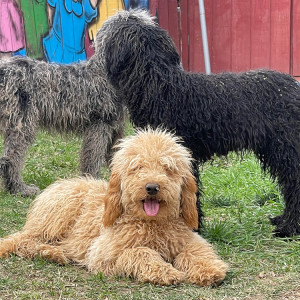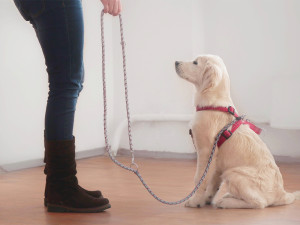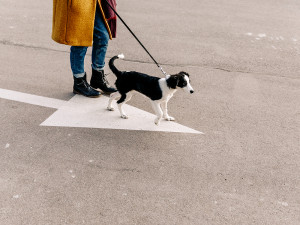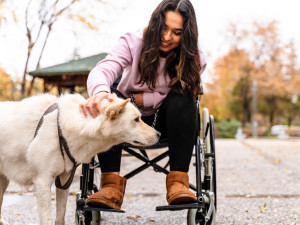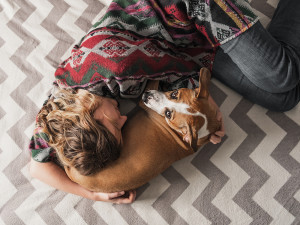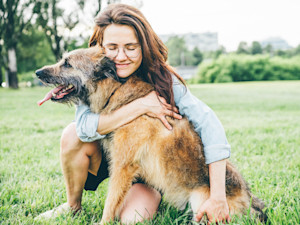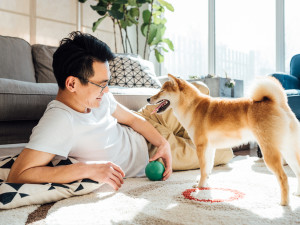Best Dogs for Seniors: What Characteristics Match Your Lifestyle?
The right rescue pup is out there.
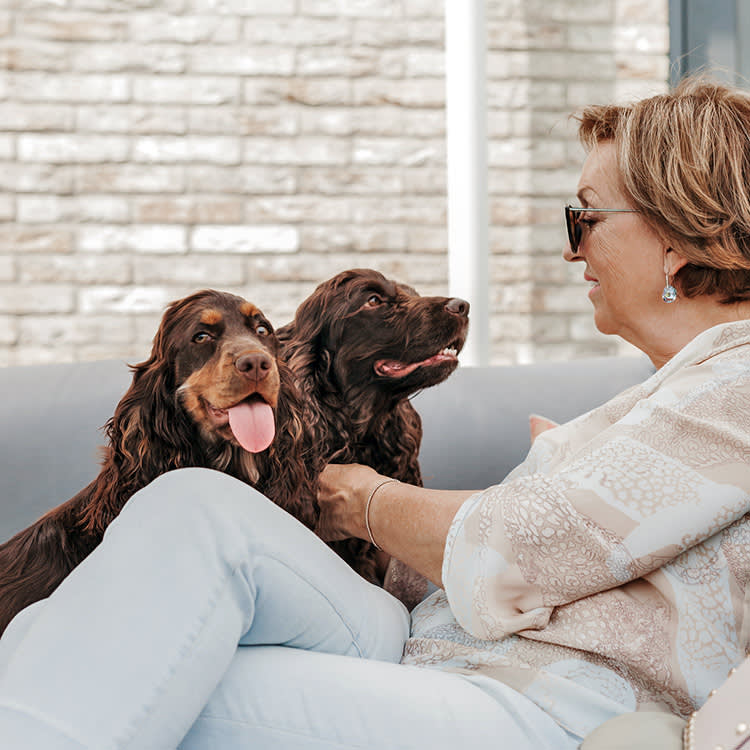
Share Article
In This Article:
Characteristics to Consider Best Dogs for Seniors Worst Dogs for Seniors Frequently Asked Questions
Dogs, regardless of age or breed, are just the best. Even better, a dog can be good for your physical and mental healthopens in new tab, and can even slow down cognitive declineopens in new tab in senior citizens and reduce anxiety symptomsopens in new tab. What can’t dogs do?
If you’re looking to add a little liveliness and companionship to your life as a senior, you often can’t go wrong with a dog. They can get you outside more and encourage you to interact with other people in your community. One studyopens in new tab even found that having a pet can help seniors enjoy life and find a sense of purpose.
“Adopting a dog brings joy to one’s life,” Alexa Jones, marketing and PR director at the Baltimore Humane Societyopens in new tab, says. “Owning a dog can help reduce stress and can help with feelings of loneliness.”
So, what are you waiting for? Take some time to think about what type of dog would be right for you and your lifestyle before visiting your local shelter or rescue to find that perfect new best friend.

Characteristics to consider when adopting as a senior
Before leaping into the world of dog parenthood, take time to think about your lifestyle and how a new pet will fit into your day-to-day life. While any dog will require some adjustments to your routine, it’s important to consider how much of a commitment you’re willing and able to make to ensure your new pet has the best possible life.
Size
Small and medium-sized dogs tend to be better fits for seniors, especially those with less active lifestyles or smaller homes. But if you have your heart set on a large dog, don’t be afraid to meet some potential new best friends at your local shelter or rescue. A senior Labrador or Retriever may be the perfect fit.
Temperament
It’s always a good idea to choose a dog who matches your own personalityopens in new tab and temperament. For example, an active human and a low-energy dog likely won’t be happy with one another. Think about what sort of personality you’re looking for in a new pet, such as whether you’d prefer a dog who’s a little less vocalopens in new tab and look for calm dogs for seniors.
“Seniors should consider adopting a pet that fits their own personal lifestyle, whether that is a more easy-going, relaxed pet for someone who enjoys staying home or an outgoing, active dog for those who are on the move more often,” Jones says.
Energy level
While each individual dog has their own personality, breed categories are often a helpful way to determine a dog’s likely characteristics. For example, sporting and herding dogs tend to be more energetic and enjoy playtime. Consider any potential new dog’s energy level before adopting and try to match their level of activity to your own.
Grooming needs
Some dogs can get by with just a bath and nail trim, while others need extensive grooming to keep their coats healthy and clean. Think about how much time, money, and energy you can invest in grooming. If your funds are limited, you may want to consider a low-maintenance dog for seniors.
Living accommodations
A smaller dog will do better in an apartment or condo with limited space than a large dog or one with a lot of energy. The best apartment dogs and best condo dogs are often more relaxed and require less space for exercise and playtime.
Age
An older dog can be the perfect fit for a senior. Many of the best senior dogs are already house-trained, spayed or neutered, and up-to-date on their vaccinations, which means less work for you. Plus, these dogs are less likely to be adopted from shelters and often desperately in need of loving homes.
Best dogs for seniors
Choosing the right dog for your home and lifestyle can be a challenge, so it’s important to do your research and spend time with any dog you’re considering adopting. Consider these breeds, which are some of the best small dogs for seniors.
Cocker Spaniel
Naturally gentle and sweet, the Cocker Spaniel is a smaller breed known for its easy-going nature and disposition.
Cavalier King Charles Spaniel
This toy breed can range in size from small to medium and boasts fewer grooming needs than other Spaniels. The Cavalier King Charles Spaniel requires less exercise than many breeds and is often content to snuggle up to their human parent, making them one of the best dogs for elderly women.
Retrievers and Labradors
For more active seniors, a Retriever or Labrador may be a great fit. These dogs love spending time outside, whether that’s a leisurely walk or lounging beside you as you garden.
Shih Tzu, Maltese, and Bichon Frisé
These three smaller breeds tend to be more low energy, making them ideal for the relaxed lifestyle and homes with more limited space. However, they do require regular grooming.
Toy Poodle
Unlike the larger Standard Poodle, the Toy breed tends to be less active but still requires frequent visits to the groomer to maintain their unique coat.
Worst dog breeds for seniors
Each dog is different and may not be right for every person. Take your lifestyle, living space, and budget into consideration when looking for the right dog to bring into your home and life.
High-energy breeds
Many seniors don’t have the energy themselves for dogs desperate for constant physical stimulation. Working dog breeds, like Border Collies and Australian Shepherds, may require a bit more activity than you are willing or able to provide. Instead, look for a dog with a moderate energy level. You may even want to adopt a senior dog, many of which are less likely to get adopted because of their age.
Large, physically demanding breeds
If you live in a smaller home or apartment, a large dog is probably not the best fit. While a Siberian Husky or Great Dane can be a wonderful companion, they often require extra space and a fenced backyard that you may not be able to provide.
Breeds or mixes with a strong prey drive
A dog with a passion for hunting or trouble with aggression may be more difficult to train or control in public settings. Reducing unwanted behaviors can be done through extensive training, but it’s a huge time and financial commitment.
Dogs with extensive grooming needs
Speaking of money and time commitments, some dogs, such as Poodles, need regular grooming to keep their coats healthy. If you have a more relaxed lifestyle, you may want to choose a lower-maintenance pet.
FAQs (People also ask):
What is the best small breed for a senior to adopt?
Many small dog breeds are easy to care for, as well as highly intelligent, often making training simpler. The Cavalier King Charles Spaniel, Maltese, Toy Poodle, and Bichon Frisé are all small breeds that may work well for the senior lifestyle.
Which dogs are easiest for older individuals to train?
Training a dogopens in new tab can be challenging, so you may want to adopt a quick learner, such as a Poodle or Labrador. Working dog breeds can also be easier to trainopens in new tab. Just keep in mind that every dog’s personality is different, and patience in training is key.
What are the best lap dogs?
Some of the best lap dogs include the Maltese, Bichon Frise, and Cavalier King Charles Spaniel, all of which may be more apt to snuggle than play. It’s important to take time to consider your lifestyle to determine which dog breed may be best for you.
Adopt a dog today
Adopting a canine companion can be beneficial not just to your new pet, but to you as well. From increased social interactions to getting out and about more often, a dog can provide significant benefits to a senior’s physical and mental health.
“The relationship between a dog and an owner can impact both because they can look to each other for comfort, companionship, and love,” Jones says. “In fact, all seniors, whether they are animals or humans, deserve a loving companion.”
References:
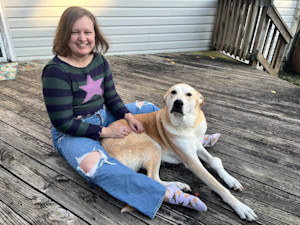
Savannah Admire
Savannah Admire is a writer and pet mom to two dogs and a cat. Under the name Savannah Cooper, she has published poetry in 40 different publications, as well as a poetry book, Mother Viper (2025). When she’s not writing, you can find her reading, taking photos, or volunteering as a content creator for her local community theatre. As a pets writer, she focuses on cat and dog behavior and pet parenthood. She currently lives in Western Maryland.
Related articles
![Person walking their dog in the street]()
How to Leash-Train a Puppy or Dog
Don’t let your new dog walk you.
![A brunette woman sitting in a wheelchair wearing a pink sweatshirt, black leggings, and brown Ugg boots petting an all white Shepherd mixed breed dog on a leash at the park outside]()
How to Register Your Dog as a Service Dog
The short answer: No animal registration is required, but service dogs still need to be properly trained.
![A woman laying on a zig zag patterned blanket while curling around her brown and white dog]()
How Do I Register an Emotional Support Animal?
Confused about ESA rules? Here’s a comprehensive guide that explains everything.
![a person hugging a senior dog]()
Want to Adopt a Senior Dog? Here’s Your Cheat Sheet to Achieving Your Dream
How to search foster rescues, shelters, and sanctuaries across the country to find the right snuggle buddy.
![Man laying on floor playing with dog]()
How to Puppy Proof Your Home
Is your home a danger zone for a new dog? Follow these pro tips.
Everything You Actually Need When You Get a New Dog
All the things you’ll want on hand as a new pet parent, from the must-haves to the nice-to-haves.


